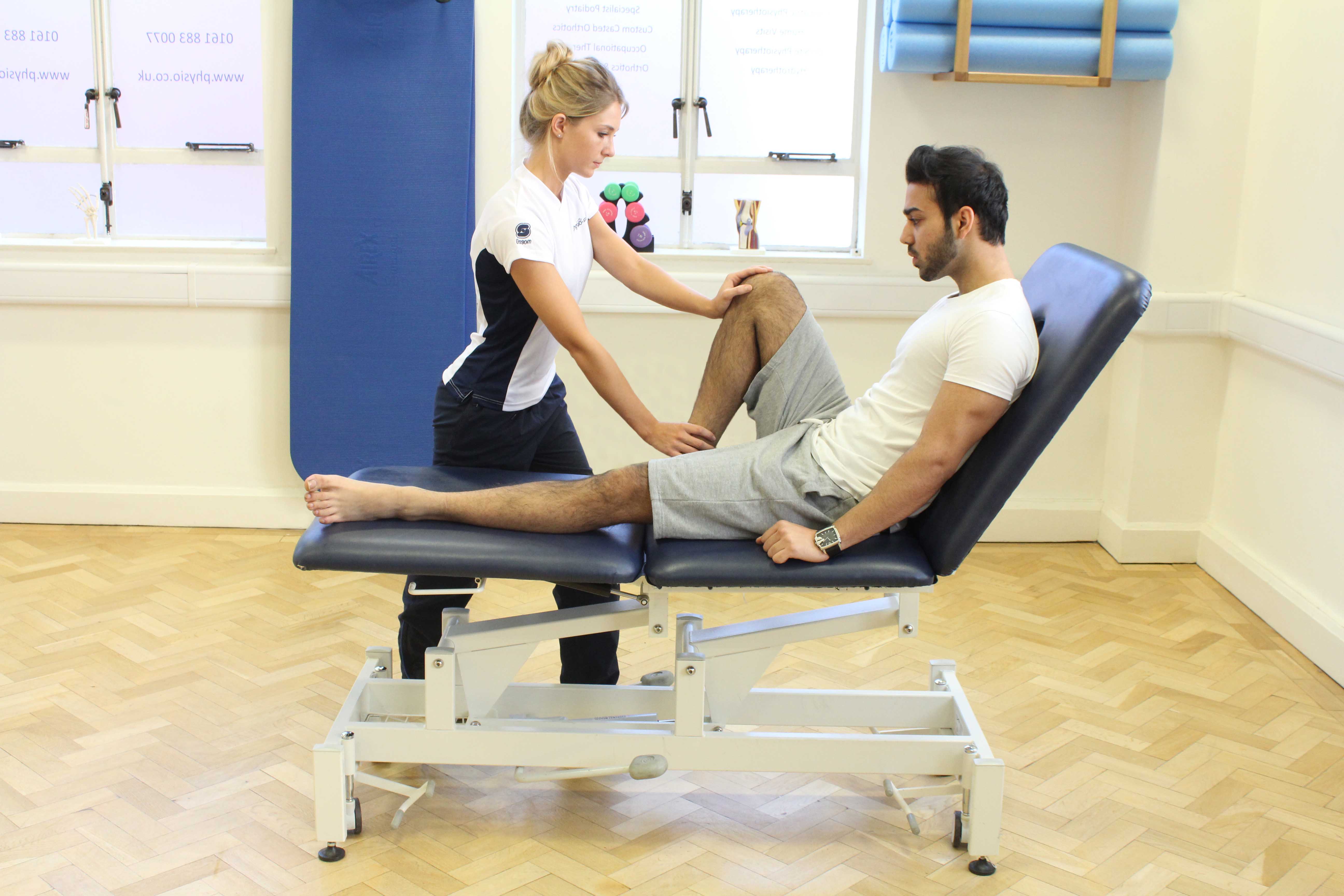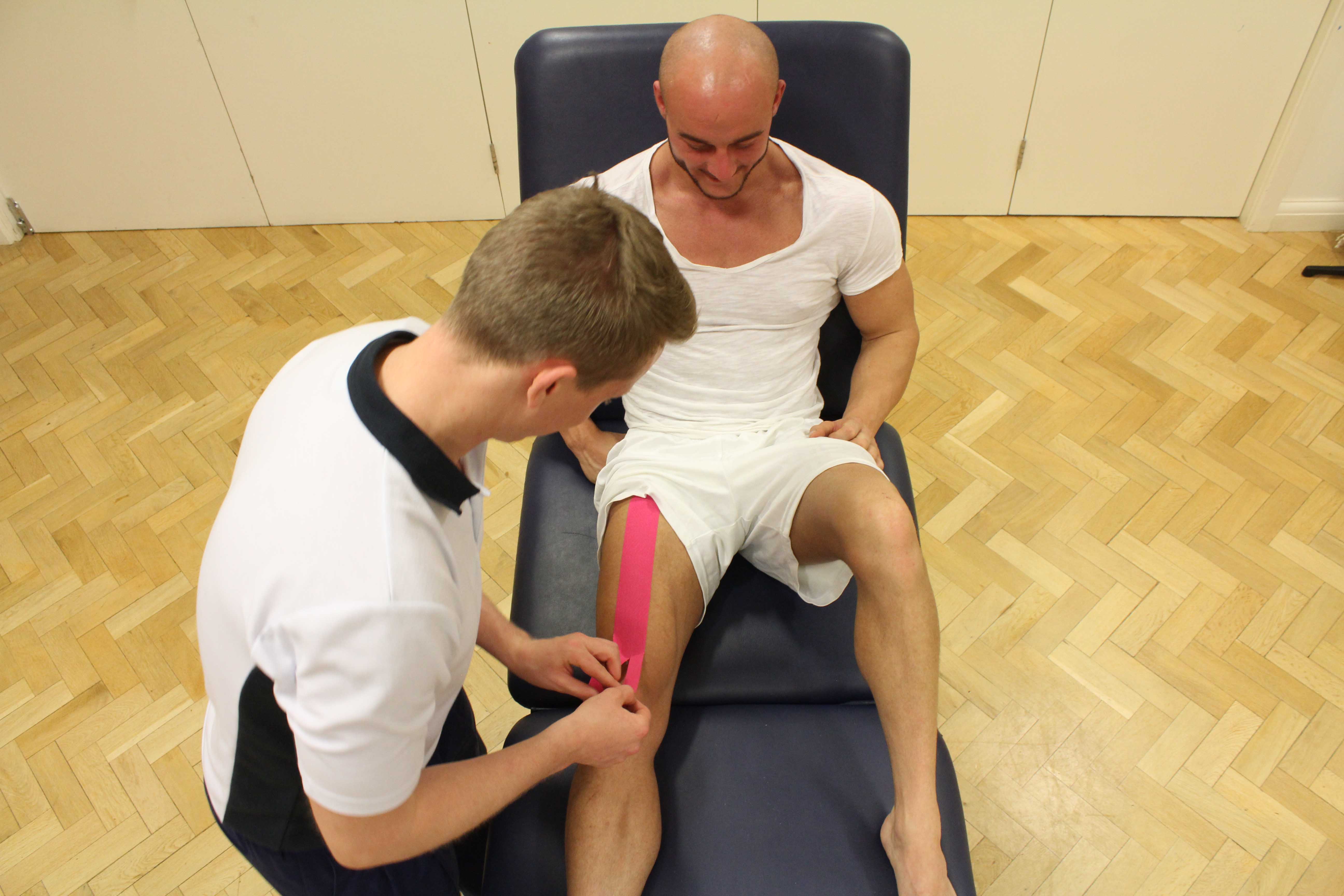What is a posterior cruciate ligament injury?
A posterior cruciate ligament or ‘PCL’ is a ligament inside the knee joint that gives the knee support. A tear to this ligament is known as a posterior cruciate ligament injury. Physiotherapy can successfully treat PCL injuries.
How does a posterior cruciate ligament injury happen?
The PCL is commonly injured by a direct blow to a bent knee. This can occur in contact sports or, most commonly, in road traffic accidents where the knee/s impact with the dashboard.
 Above: Therapist performing knee assessment
Above: Therapist performing knee assessmentWhat are the symptoms of a posterior cruciate ligament injury?
A deep pain within or at the back of the knee is felt with a PCL injury. In some cases there is an audible snap or pop. Other symptoms include:
What should I do if I have a posterior cruciate ligament injury?
If you have injured your PCL you should stop your activity immediately. To control the amount of swelling, the RICE regime should be followed (Rest, Ice, Compression, Elevation). You should also arrange an initial physiotherapy assessment as soon as possible.
Physiotherapy treatment for a posterior cruciate ligament injury.
Patients who think they have a PCL tear should arrange an assessment as soon as possible. At the assessment, specific tests will be performed to determine if you have injured your PCL. It can, however, be difficult to diagnose PCL injuries immediately after an injury as pain, swelling and muscle spasm can limit the assessment. Some patients are referred for MRI scans or to orthopaedic surgeons if it is deemed appropriate.
Following your initial assessment, your physiotherapist will be able to determine how your injury is to be managed and determine an appropriate programme of treatment. If the PCL is torn completely then surgery may be required to reconstruct or repair the ligament. If the ligament is partially torn then your injury will not be managed surgically.
Physiotherapy is extremely important in the rehabilitation of PCL injuries, whether surgery is to be performed or not.
 Above: Specialist physiotherapist applying supportive tape to the knee
Above: Specialist physiotherapist applying supportive tape to the kneePhysiotherapy treatment if surgery is to be performed following a posterior cruciate ligament injury.
Physiotherapy treatment should start immediately after you tear your PCL. Initially, the focus is on reducing swelling and restoring full range of movement. Many orthopaedic surgeons will not operate unless the injured knee has a full range of movement. A strengthening programme will be written for you to complete before your surgery. The stronger your leg is before surgery the faster your recovery afterwards. This is known as prehabilitation.
After the surgery the focus is, once again, on reducing swelling, pain, increasing range of movement and maintaining as much muscle strength as possible. The rehabilitation that you receive after your operation will depend on the exact type surgery that you had and any preferences that your orthopaedic surgeon may have. Physio.co.uk will liaise with your surgeon throughout your rehabilitation.
The normal timeframe for rehabilitation back to contact sports following PCL reconstruction is six to eight months after the date of the surgery. The time it takes to rehabilitate an individual back to ‘normal activity’ largely depends on the individual themselves, their motivation and the level of activity that they wish to achieve. The amount of time before you can return to work varies according to the demands of your job. Your physiotherapist and orthopaedic surgeon will be able to advise you on how soon after the operation you can expect to return to work. An individual may return to contact sports when the pain and swelling have subsided, the knee has full range of movement, the strength and endurance of the muscles have returned to normal and balance and neuromuscular control have been regained. The timeframe for recovery is, however, continually being reduced with advances in surgery and the use of accelerated rehabilitation programmes.
Physiotherapy treatment if the knee is to be managed conservatively following a posterior cruciate ligament injury.
Physiotherapy should start immediately after you tear your PCL. The aim of rehabilitation is to allow you to return to normal activity, whether that be work or sport, as soon as possible, increase the stability of your knee, and reduce the chances of you damaging your knee further when you do return. As with individuals who are to be managed with surgery, the initial focus is on reducing swelling and restoring full range of movement. Once the range of movement is restored and pain and swelling have been reduced then the focus changes to increasing the strength and control of the muscle groups around the knee and improving balance.
The timeframe for recovery when surgery is not performed varies greatly because it is dependent on numerous factors. Your physiotherapist will be able to advise you further on timeframes for recovery at your initial assessment.
Physiotherapy in both circumstances may include:
What shouldn’t I do if I have a posterior cruciate ligament injury?
If you have or suspect you have injured your PCL, you shouldn’t continue to participate. This may cause your knee to give way or collapse, potentially injuring other structures. In addition, you shouldn’t undertake activities which increase blood flow to the injured knee within the first 48 hours of your injury. These include hot showers, heat rubs, the consumption of alcohol and excessive activity. These may increase the bleeding and swelling around the injured ligament and potentially prolong your recovery.
Could there be any long-term effects from a posterior cruciate ligament injury?
Return to work or sports may be delayed if at the time of your injury, you also injured one or more of the surrounding structures. These include the cartilage and other ligaments. Injury to these structures may result in prolonged swelling, pain and a slower recovery.
To arrange a physiotherapy assessment call Physio.co.uk on 0330 088 7800 or book online.

 0330 088 7800
0330 088 7800





































